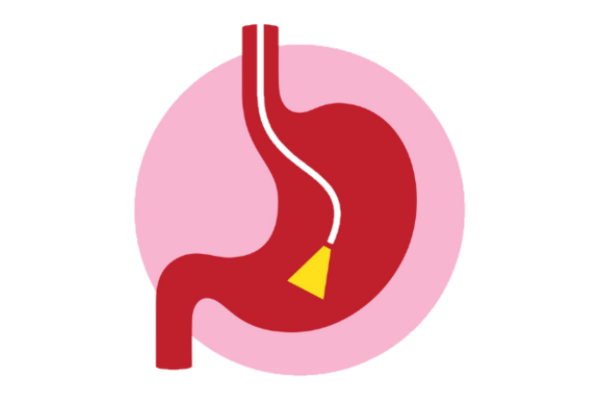By Prof Mark E McAlindon, Academic Department of Gastroenterology and Hepatology, Sheffield Teaching Hospitals NHS Trust, Sheffield, UK
What is a Colon Capsule Endoscope?
A capsule endoscope contains batteries, light-emitting diodes, antenna, and an imaging device (Figure 1), which transmits data to a recorder that the patient wears on a belt. The data are subsequently downloaded onto a computer in the form of a video for reading and reporting (Figure 2). Whereas the small lumen and uniform cylindrical shape of the small bowel allows a capsule endoscope to progress distally in a reasonably smooth manner without excessive side-to-side movement or tumbling, the larger colonic volume and haustral folds presents challenges. This was addressed by installing cameras at both ends of the capsule to allow simultaneous antegrade and retrograde views, but studies with the first model were disappointing. The second version of the colon capsule endoscope however, in addition to having an increased field of view (from 156º to 172º, providing a near 360º view), is programmed to acquire images for 10‒12 h at a rate that varies according to the speed of transit: four images per second are obtained when the capsule is almost stationary up to a maximum of 35 per second when propelled rapidly by peristalsis.1
How does it compare to Colonoscopy in Diagnostic Ability?
The most recent meta-analysis shows that compared to colonoscopy, colon capsule endoscopy (CCE) has 87% sensitivity and 95% specificity for detection of polyps of ≥10 mm. These values were achieved despite variable completion rates of between 57% and 100%. One study found 97% sensitivity for detection of polyps of this size if incomplete examinations were excluded, which exceeded that of colonoscopy.2 Systematic reviews demonstrated detection of cancer in 44 cases; cancers missed were due to eight incomplete examinations, one lesion being incorrectly measured as ≤5mm (it was a malignant 10mm polyp) and a cancer of which an image was saved but not commented on by the reporter. 2,3 CCE has also detected inflammation (Mayo endoscopic subscore of ≥0) with sensitivity of 97% in patients with ulcerative colitis.4
How does it compare to CT Colonography?
The relative sensitivity for detection of polyps >9 mm of is 1.91 (95% confidence interval 1.18‒3.09) compared to CT colonography and is even greater for smaller polyps (≥5‒≤9 mm; 2.67, 95% confidence interval 1.76‒4.04).5 More flat and depressed lesions were detected by CCE than CT (87% versus 67%, P=0.01) in a series of 30 patients for whom submucosal dissection was planned.6
How does Colonoscopy compare to repeat Colonoscopy?
Meta-analysis of back-to-back or ‘tandem’ colonoscopy studies (in which the patient undergoes a second colonoscopy by an endoscopist who is unaware of the other’s findings) suggests a colonoscopy miss rate of 9% for advanced adenomas (³10 mm in size or containing villous component or high-grade dysplasia) and 26% for all adenomas.7
What is the Bowel Preparation?
The European Society of Gastrointestinal Endoscopy guidelines8 recommend a liquid diet beginning the day before the procedure and bowel cleaning with 2 L polyethylene glycol electrolyte solution in the evening before and on the morning of CCE. An oral promotility agent is administered if gastric emptying is longer than 1 h, and two further boosters of low-dose sodium phosphate may be given to propel the capsule through the small bowel into the colon. Some patients might not need the second booster. If the capsule has not been excreted at the end of the day, a bisacodyl suppository may be administered. Further research is needed to maximise completeness and quality of preparation.8
How does Colon Capsule Endoscopy compare to other Colonic Imaging Modalities in terms of Patient Experience?
As yet, there is no validated patient-related experience measure for CCE and conflicting data exists about preference over CT colonography.10,11 However, procedure-related distress (discomfort and embarrassment) seems to be less during CCE than colonoscopy,10,11 no sedation is used, and the procedure appears more acceptable to and preferred by patients.4,11 These advantages need to be balanced against the longer test duration, lack of immediate results, and the possibility of a second procedure if endoscopic therapy, biopsy, or polypectomy is needed (Figures 3‒5). No major complications have been reported with CCE.3,8,14
What are the indications for Colon Capsule Endoscopy?
Guidelines suggest that CCE is feasible, safe, and accurate in individuals at average risk of colorectal cancer and that it might be considered in those who have incomplete examination by or have declined colonoscopy.8,12,13 Preliminary results of the ScotCap project study of CCE as a primary diagnostic tool suggest that colonoscopy may be avoided in 70% of patients assessed,14 although some patients might also need flexible sigmoidoscopy if the CCE recording is incomplete. The NHS England pilot of CCE in patients referred on the Two Week Wait pathway due to faecal immunochemical test values of 10‒100 µg haemoglobin/g is currently being rolled out, and it is hoped that this will provide valuable information about the role of CCE as a first-line diagnostic test.15 The pilot aims to provide an alternative diagnostic test while colonoscopy investigations are delayed due to the COVID-19 pandemic. However, this patient cohort has about a 20% risk of organic disease (inflammatory bowel disease, cancer, or advanced adenomas) and it seems likely that in the future, CCE would be best suited for use in low-risk patients (FIT <10 µg/g) who form almost 80% of referrals to investigate symptoms and for whom subsequent colonoscopy is much less likely to be needed.16
How long does it take to read and report?
The imaging from each of the two cameras is viewed separately, in sequence, and takes 50‒60 minutes if viewed at 12 frames per second; 9 while the time is shorter at a more rapid speed, this risks missing small polyps.17 The use of artificial intelligence is likely to change this practice: deep convolution neural networks detect small bowel capsule endoscopy pathology with a sensitivity of over 99% compared to 75% for conventional reading by gastroenterologists, and the read time is reduced 16-fold to 6 minutes.18 Colonic algorithms are in development.19
Learning points
- Colon capsule endoscopy (CCE) has a similar diagnostic sensitivity to colonoscopy in clinical trials, although studies in routine clinical practice are needed.
- Current guidelines recommend CCE for average-risk patients (rather than those likely to need biopsy or polypectomy) or those who have incomplete examination by or have declined colonoscopy.
- Although there are no patient-related experience measures validated for CCE, studies suggest that tolerance and experience seem to favour CCE over colonoscopy.
Conflicts of interest
The author has received research support from Given Imaging, Intromedic, Jinshan Science, Medtronic, and Ankon Ltd, a consultancy fee from Medtronic, and travel costs from Ankon Ltd to travel to Shanghai for training in the use of magnetic capsule endoscopy.
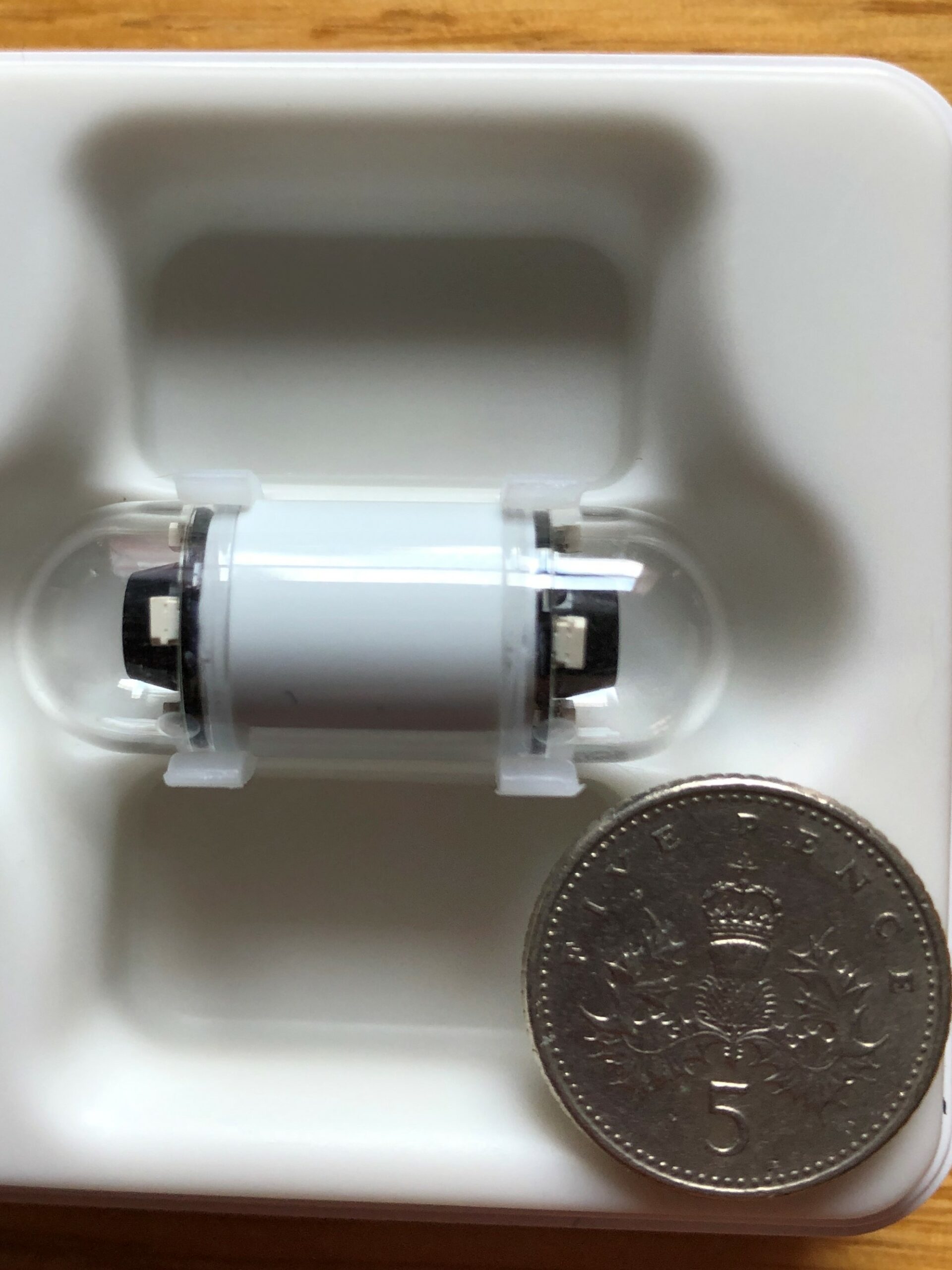
Figure 1: Colon capsule endoscope
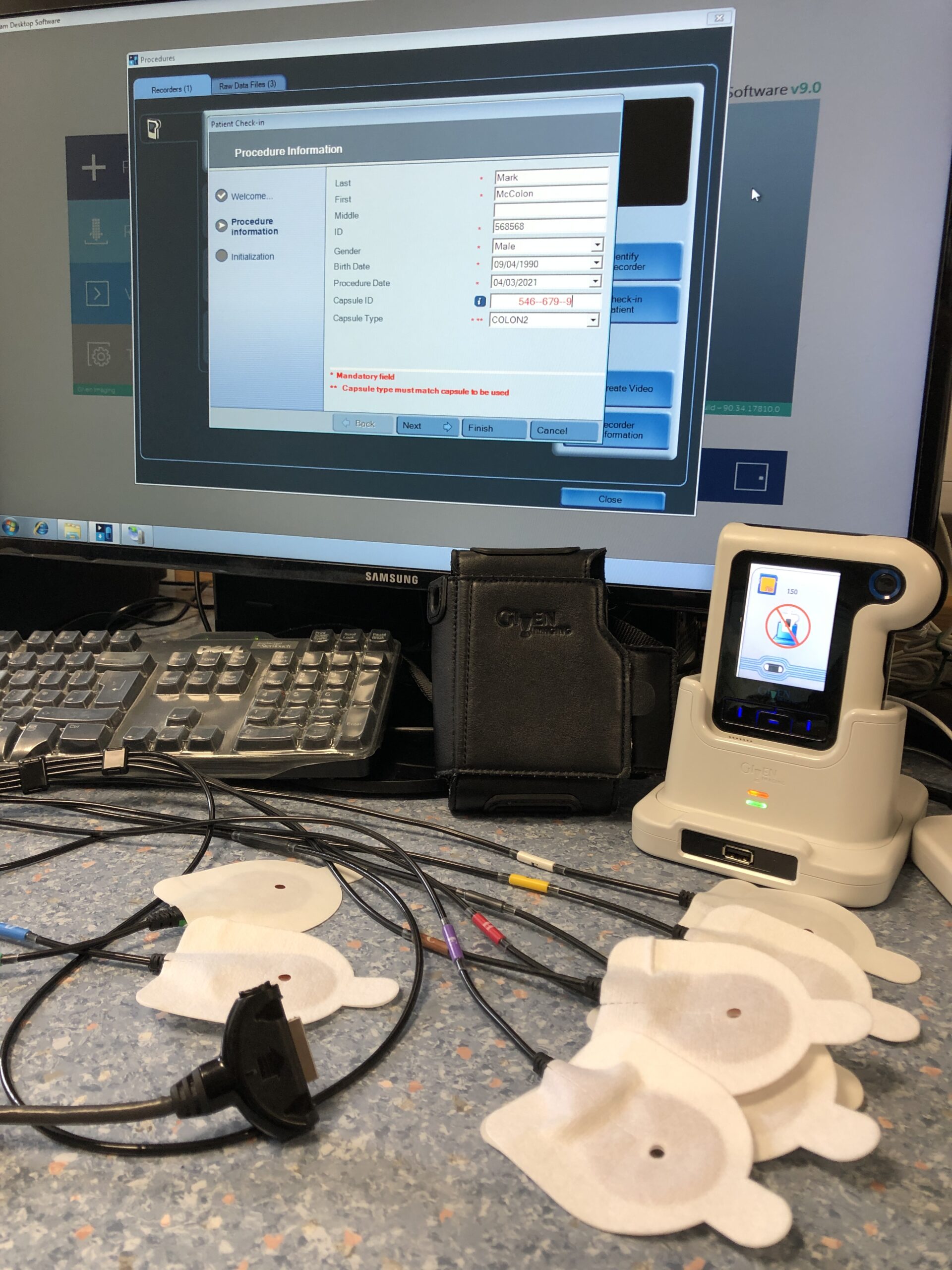
Figure 2: Data recorder, sensor leads, and computer workstation
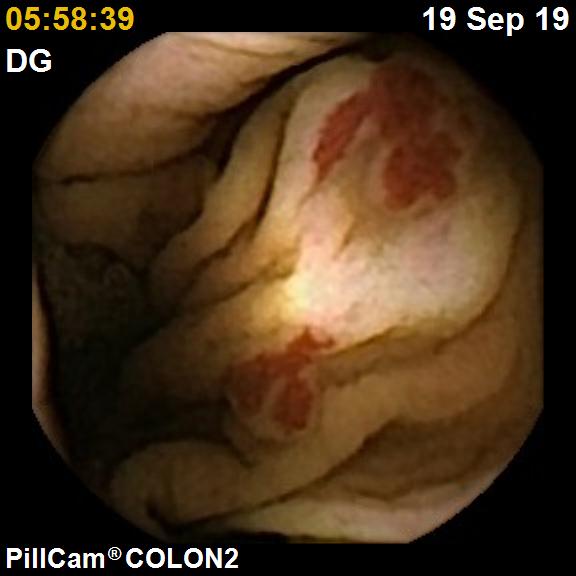
Figure 3: Colonic angioectasia
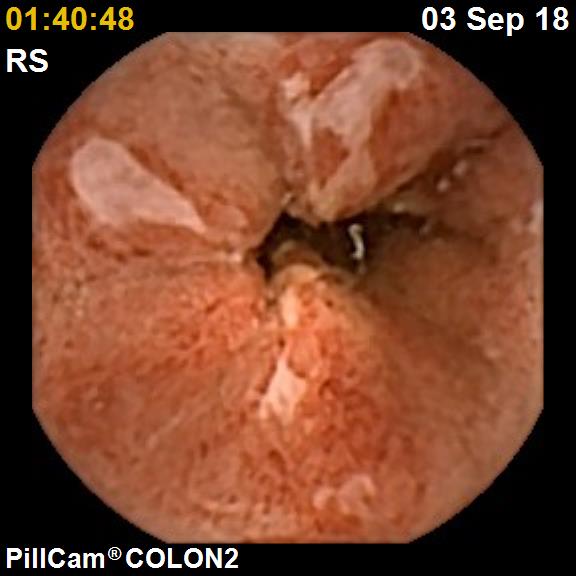
Figure 4: Ulcerative colitis
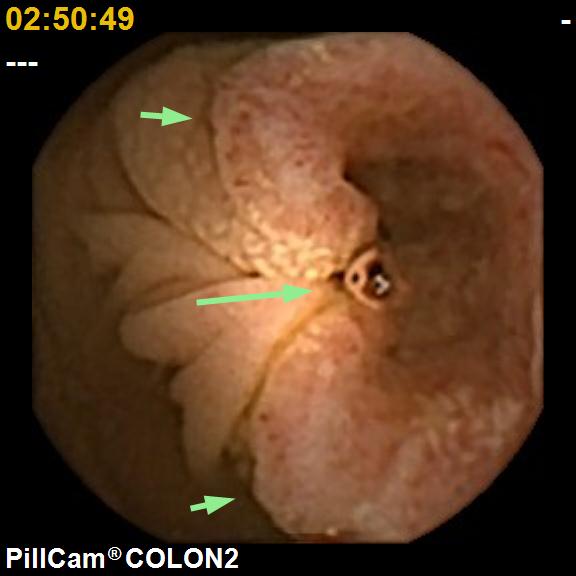
Figure 5: Adenocarcinoma of the colon
Author Biography
Professor Mark McAlindon is a gastroenterologist in Sheffield Teaching Hospitals NHS Trust. The Academic Department of Gastroenterology and Hepatology is the NHS England National Centre for Refractory Coeliac Disease and a World Endoscopy Organisation centre of excellence. He has a research interest in capsule endoscopy, particularly its role in the colon, and robot-controlled magnetic capsule endoscopy of the upper gastrointestinal tract. He is currently the British Society of Gastroenterology Quality Improvement Lead for small bowel endoscopy and a member of the NHSE Colon Capsule Endoscopy Advisory Board for the national colon capsule endoscopy pilot.
CME
Newly formed ATSMs in ERCP and BSCP
24 November 2025
National Clinical Endoscopists Conference 2025 Recording
13 November 2025
Quality Indicators in Barrett's Endoscopy: A Quest for the Holy Grail
27 October 2025
- MacLeod C, Monaghan E, Banerjee A, et al. Colon capsule endoscopy. Surgeon 2020;18:251-256. doi: 10.1016/j.surge.2020.01.008.
- Kjølhede T, Ølholm AM, Kaalby L, Kidholm K, Qvist N, Baatrup G. Diagnostic accuracy of capsule endoscopy compared to colonoscopy for polyp detection: systematic review and meta-analyses. Endoscopy 2020; published online ahead of print Aug 28. doi: 10.1055/a-1249-3938.
- Vuik FER, Nieuwenburg SAV, Moen S, et al. Colon capsule endoscopy in colorectal cancer screening: a systematic review. Endoscopy 2021; published online ahead of print Jan 13. doi: 10.1055/a-1308-1297.
- Shi HY, Chan FKL, Higashimori A, et al. A prospective study on second-generation colon capsule endoscopy to detect mucosal lesions and disease activity in ulcerative colitis (with video). Gastrointest Endosc 2017;86:1139-1146. doi: 10.1016/j.gie.2017.07.007.
- Deding U, Herp J, Havshoei A-L, et al. Colon capsule endoscopy versus CT colonography after incomplete colonoscopy. Application of artificial intelligence algorithms to identify complete colonic investigations. United European Gastroenterol J 2020;8:782-789. doi: 10.1177/2050640620937593.
- Utano K, Katsuki S, Matsuda T, et al. Colon capsule endoscopy versus CT colonography in patients with large non-polypoid tumours: A multicentre prospective comparative study (4CN Study). Digestion 2020;101:615-623. doi: 10.1159/000501609.
- Zhao S, Wang S, Pan P, et al. Magnitude, risk factors, and factors associated with adenoma miss rate of tandem colonoscopy: a systematic review and meta-analysis. Gastroenterology 2019;156:1661-1674. doi: 10.1053/j.gastro.2019.01.260.
- Spada C, Hassan C, Galmiche JP, et al; European Society of Gastrointestinal Endoscopy. Colon capsule endoscopy: European Society of Gastrointestinal Endoscopy (ESGE) guideline. Endoscopy 2012;44:527-36. doi: 10.1055/s-0031-1291717.
- Rondonotti E, Borghi C, Mandelli G, et al. Accuracy of capsule colonoscopy and computed tomographic colonography in individuals with positive results from the fecal occult blood test. Clin Gastroenterol Hepatol 2014;12:1303–1310. doi: 10.1016/j.cgh.2013.12.027.
- Thygesen MK, Baatrup G, Petersen C, Qvist N, Kroijer R, Kobaek-Larsen M. Screening individuals’ experiences of colonoscopy and colon capsule endoscopy; a mixed methods study. Acta Oncol 2019; 58(suppl 1):S71-S76. doi: 10.1080/0284186X.2019.1581372.
- Ojidu H, Palmer H, Lewandowski J, et al. Patient tolerance and acceptance of different colonic imaging modalities: an observational cohort study. Eur J Gastroenterol Hepatol 2018;30:520-525. doi: 10.1097/MEG.0000000000001090.
- Enns RA, Hookey L, Armstrong D, et al. Clinical practice guidelines for the use of video capsule endoscopy. Gastroenterology 2017;152:497-514. doi: 10.1053/j.gastro.2016.12.032.
- Spada C, Hassan C, Bellini D, et al. Imaging alternatives to colonoscopy: CT colonography and colon capsule. European Society of Gastrointestinal Endoscopy (ESGE) and European Society of Gastrointestinal and Abdominal Radiology (ESGAR) Guideline – update 2020. Endoscopy 2020;52:1127-1141. doi: 10.1007/s00330-020-07413-4.
- MacLeod C, Wilson P, Watson AJM. Colon capsule endoscopy: an innovative method for detecting colorectal pathology during the COVID-19 pandemic? Colorectal Dis 2020;22:621-624. doi: 10.1111/codi.15134.
- NHS. Clinical guide for using colon capsule endoscopy in the lower gastrointestinal pathway. November 2020. https://www.nice.org.uk/Media/Default/About/COVID-19/Specialty-guides/triaging-patients-with-lower-gi-symptoms.pdf (access March 31, 2021).
- Mowat C, Digby J, Strachan JA, et al. Impact of introducing a faecal immunochemical test (FIT) for haemoglobin into primary care on the outcome of patients with new bowel symptoms: a prospective cohort study. BMJ Open Gastroenterol 2019;6:e000293. doi: 10.1136/bmjgast-2019-000293.
- Pecere S, Senore C, Hassan C, et al. Accuracy of colon capsule endoscopy for advanced neoplasia. Gastrointest Endosc 2020;91:406-415. doi: 10.1016/j.gie.2019.09.041.
- Ding Z, Shi H, Zhang H, et al. Gastroenterologist-level identification of small-bowel diseases and normal variants by capsule endoscopy using a deep-learning model. Gastroenterology 2019;157:1044-1054. doi: 10.1053/j.gastro.2019.06.025.
- Yamada A, Niikura R, Otani K, Aoki T, Koike K. Automatic detection of colorectal neoplasia in wireless colon capsule endoscopic images using a deep convolutional neural network. Endoscopy 2020; published online ahead of print Sept 18. doi: 10.1055/a-1266-1066.
